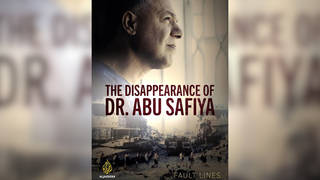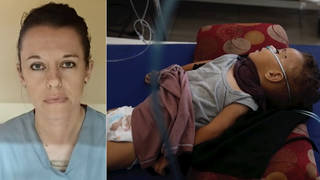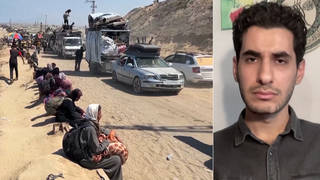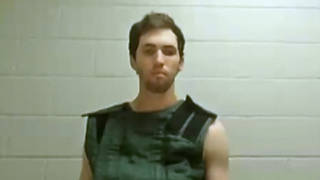
Donald Trump is the front-runner as he enters the final Republican presidential debate ahead of next week’s Super Tuesday primary. He is also featured on the cover of a new report by the Southern Poverty Law Center, “The Year in Hate and Extremism.” We speak with SPLC President Richard Cohen, who notes that “[o]ver 60 percent of the people who support Trump believe that President Obama is a secret Muslim and wasn’t born in this country.” The report points to the presidential election cycle as one of the primary reasons for the rising number of hate groups across the U.S., saying last year was marked by a level of hate speech in mainstream politics not seen in decades. The Investigation Discovery network will premiere a series titled “Hate in America,” based on the work of the Southern Poverty Law Center, this Monday, February 29, at 8 p.m. Eastern.
Transcript
NERMEEN SHAIKH: Tonight, [ five ] Republican presidential contenders will face off in Houston during the final debate ahead of next week’s Super Tuesday primary, when delegates in Texas and 10 other states, along with American Samoa, will be at stake. This comes as billionaire businessman Donald Trump easily won the Nevada caucus Tuesday night, capturing 46 percent of the vote in his third consecutive victory. Trump thanked supporters during a victory speech in Nevada.
DONALD TRUMP: So, we won the evangelicals. We won with young. We won with old. We won with highly educated. We won with poorly educated—I love the poorly educated—with the smartest people, with the most loyal people. And you know what I really am happy about? Because I’ve been saying it for a long time—46 percent with the Hispanics, 46 percent, number one with Hispanics. I’m really happy about that. So—
TRUMP SUPPORTERS: Trump! Trump! Trump! Trump! Trump! Trump! Trump!
NERMEEN SHAIKH: Donald Trump will be one of five candidates who face off in tonight’s debate. Well, Donald Trump is featured in a new report just published by the Southern Poverty Law Center called “The Year in Hate and Extremism.” Its cover includes an image of Trump in front of a microphone. The report details how the number of hate groups rose 14 percent last year, bringing the total number of hate groups in the U.S. to nearly 900. It found the number of Ku Klux Klan groups more than doubled. It also documented 34 anti-Muslim hate groups and 48 anti-LGBTQ hate groups.
AMY GOODMAN: The Southern Poverty Law Center points to the presidential election cycle as one of the primary reasons for the rising number of hate groups across the U.S., saying last year was marked by a level of hate speech in mainstream politics not seen in decades. It notes, quote, “Donald Trump’s demonizing statements about Latinos and Muslims have electrified the radical right, leading to glowing endorsements from white nationalist leaders such as Jared Taylor and former Klansman David Duke. White supremacist forums are awash with electoral joy, having dubbed Trump their 'Glorious Leader.'” The Investigation Discovery network will premiere a series titled Hate in America, based on the work of the Southern Poverty Law Center, this Monday, February 29th.
Well, for more, we’re joined by the center’s president, Richard Cohen.
Welcome back to Democracy Now! It’s great to have you for the first time in our studio—
RICHARD COHEN: Thank you, Amy.
AMY GOODMAN: —on our 20th anniversary.
RICHARD COHEN: Perfect!
AMY GOODMAN: So, talk about this report. The picture right here, “The Year in Hate and Extremism,” with the major face on the cover, Donald Trump, in front of a microphone.
RICHARD COHEN: I’m not sure that Mr. Trump would object to being center stage. He never seems to. And it’s been an unusual time. You know, usually in the white supremacist world, the attitude is “a pox on both their homes; you know, the system is incredibly corrupt.” This time, you know, as you said, people are very, very excited about Trump. They call him the glorious leader. And it’s all about the immigration issue.
AMY GOODMAN: Who is “they”?
RICHARD COHEN: People like Jared Taylor.
AMY GOODMAN: And explain who Jared Taylor is.
RICHARD COHEN: Jared Taylor is a longtime white nationalist. Most recently he came into the public mind because he served as the spokesperson for the Council of Conservative Citizens. That was the hate group whose Kool-Aid Dylann Roof drank when he was radicalized. So, you know, he has been a real fixture on the white supremacist scene and a very influential one.
NERMEEN SHAIKH: So could you talk about some of the main findings of the report?
RICHARD COHEN: Sure, sure. Well, first, you know, we saw an increase in the number of hate groups in the country, going from about 800 to 900. We also saw a similar increase of 14 percent to about a thousand of these radical antigovernment groups, the people who believe that, you know, there are FEMA camps that are awaiting is, that people are trying to make us into the New World Order. Secondly, we saw a really incredible level of violence last year, what was the massacre in Charleston, most well known, but really scores of events, some quite deadly. And lastly, of course, the mainstreaming of hate in the political campaign and by pundits on the airwaves.
AMY GOODMAN: What about—what about the media’s role, Richard?
RICHARD COHEN: I mean, the media amplifies the hate that’s out there. They give—you know, every time Donald Trump starts talking about rapists from Mexico and whatnot, it’s blasted all over the air. It coarsens, you know, kind of, our society. It makes it almost acceptable to talk that way.
NERMEEN SHAIKH: And you say in the report that the radical right has shifted its principal base to the Internet. Why is that important?
RICHARD COHEN: Well, you know, it used to be the case that if you wanted to get your fill of hate, you’d go to a Klan rally or cross burning. Nowadays you can do it from your home, and you have the—you know, it’s easier, and you have the benefit of anonymity. And we’ve seen, during President Obama’s administration, a tremendous increase in the number of persons who were online haters. Stormfront, which is the most important online forum for hate members, has grown by 100 percent since Obama has been in office. This is—these are 300,000 people, who don’t just visit—millions visit—but 300,000 people who have signed up and—you know, for posting privileges, so they can spew their venom daily.
AMY GOODMAN: You talk about terrorist attacks and radical plots—
RICHARD COHEN: Yeah.
AMY GOODMAN: —proliferating.
RICHARD COHEN: Yes.
AMY GOODMAN: We’re not talking about ISIS.
RICHARD COHEN: No.
AMY GOODMAN: So, explain exactly what we’re talking about.
RICHARD COHEN: Well, you know, we did a report and showed that there was a terrorist attack or a domestic incident, domestic terrorism, about once every 34 days over the last five years. Some of these attacks of course are, you know, kind of well known, like the massacre in Charleston, the—
AMY GOODMAN: At the Emanuel Church.
RICHARD COHEN: Right—the killings in the Planned Parenthood. But I just think people don’t get a sense of, you know, how—
AMY GOODMAN: In Colorado Springs.
RICHARD COHEN: Yeah—how common these things are.
NERMEEN SHAIKH: Well, some have criticized the methodology used in the SPLC report. Vanderbilt University political science professor Carol Swain has argued that the SPLC is too all-encompassing, saying they, quote, “paint with a very broad brush, and in the process they tend to sweep up people that are politically conservative. … I think they do it in a very harmful way and they abuse their power as an organization.” She goes on to say, quote, “These are individuals that are Christian conservatives—they’re just traditional conservatives—but because of their position on LGBT issues, the Southern Poverty Law Center finds ways to malign these individuals or their organizations.” Richard Cohen, your response to this criticism?
RICHARD COHEN: Well, our methodology is well known. We call groups hate groups when they vilify entire groups of people because of their immutable characteristics. You know, Focus on the Family is a very conservative Christian organization, and we certainly don’t call them a hate group. But we would call groups that spread demonizing lies about the LGBT community, lies such as, you know, pedophilia is a problem for the gay community, or the American Family Association saying that, you know, gay people brought us the Holocaust and black people rut like rabbits—I think that you can call yourself the American Family Association, you can wrap yourself in the Bible, but when you say things like that, I think you deserve the moniker of a hate group.
NERMEEN SHAIKH: Well, you also say that—the report says that there has been a 14—which we’ve talked about—14 percent increase in hate groups—
RICHARD COHEN: Yes.
NERMEEN SHAIKH: —in 2015. But the report also indicates that that’s probably an underestimation.
RICHARD COHEN: Yeah.
NERMEEN SHAIKH: Could you explain?
RICHARD COHEN: Well, you know, our methods of detecting hate groups aren’t foolproof. And we certainly—there’s obvious an undercount. Also, it doesn’t take into account, you know, the hundreds of thousands of people who aren’t formally affiliated with hate groups but have hate in their hearts. It’s just one indicator of the level of rage, the level of vitriol, that exists in the country.
AMY GOODMAN: Last year, Donald Trump faced criticism after a town hall in New Hampshire when, during the Q&A, one of his supporters stood up and said President Obama is a Muslim and not even an American, and asked when the United States could get rid of Muslims.
DONALD TRUMP: OK, this man. I like this guy.
TRUMP SUPPORTER: I’m from White Plains. Amen, OK? We have a problem in this country. It’s called Muslims. We know our current president is one.
DONALD TRUMP: Right.
TRUMP SUPPORTER: You know he’s not even an American. Birth certificate, man.
DONALD TRUMP: We need this question; this is the first question.
TRUMP SUPPORTER: But anyway, we have training camps brewing where they want to kill us.
DONALD TRUMP: Mm-hmm.
TRUMP SUPPORTER: That’s my question: When can we get rid of them?
DONALD TRUMP: We’re going to be looking at a lot of different things. And, you know, a lot of people are saying that, and a lot of people are saying that bad things are happening out there. We’re going to be looking at that and plenty of other things.
AMY GOODMAN: Your response to what Donald Trump said in this town hall meeting, Richard Cohen?
RICHARD COHEN: Well, I’m not surprised by the supporter who stood up. Over 60 percent of the people who support Trump believe that President Obama is a secret Muslim and wasn’t born in this country. So, you know, none of that surprises me. You know, what we’re hearing on the campaign trail, what is leading to the increase in the number of hate groups in our country, is the changing demographics of our country. It’s changing rapidly. And I think, you know, many white people feel like the tide is turning against them. And so we have a reaction to that. We see the reaction in the vilification of Muslims. We see the reaction to it in the vilification of kind of Hispanics. You know, a generation ago, it was the Southern strategy. Now, you know, it’s—different people are targeted.
AMY GOODMAN: How does Oregon fit into this, the standoff that was just finished with the death of the spokesperson and the others in jail?
RICHARD COHEN: Well, I think what really fits into it is what happened on Cliven Bundy’s ranch. You know, he refuses to pay his grazing fees, doesn’t pay his fines. They point—
AMY GOODMAN: This is in Nevada.
RICHARD COHEN: Yeah. They point guns at federal officials, and nothing happens. And so, as a result, the antigovernment patriot organization group grows tremendously and are emboldened. Then they show up in Oregon and take over that—that compound. And, of course, they eventually arrested Cliven Bundy, but they could have arrested him the day after the standoff in Nevada. And I think it was the failure of the federal officials to move more quickly, originally, that led to the explosion in antigovernment groups and led to the situation in Oregon.
NERMEEN SHAIKH: But what are some of the other factors? Because the report talks about how many Americans are now antigovernment.
RICHARD COHEN: Yes.
NERMEEN SHAIKH: What do you think accounts for this growth in suspicion of the government, in addition to what you pointed out? Do you think that having the first, for example, African-American president has contributed to that?
RICHARD COHEN: I think that’s absolutely right. We’ve seen this tremendous increase in the number of antigovernment groups during President Obama’s tenure. You know, there was a big increase during the time of Bill Clinton, then it went down during George Bush’s presidency, and now it’s shot up again under President Obama’s tenure. And there’s also—you know, this changing demographics makes people less trustful of the efficacy of collective action. It’s kind of a well-known sociological fact. And, of course, the vehicle of collective action in our country, perhaps the most important vehicle, is the government itself. So people have lost confidence in institutions.
AMY GOODMAN: And the collapse of the economy for many, not for all.
RICHARD COHEN: Absolutely. You know, we kind of—white working-class people, you know, their prospects aren’t nearly as good as they were a generation ago. And so there’s a tremendous amount of angst and anger in the country as a result.
AMY GOODMAN: On Monday, Investigation Discovery will air a new documentary series called Hate in America: Klan on Trial, recounting the story of Michael Donald, the victim of brutal Klan violence in Mobile, Alabama, in the early ’80s. The SPLC took the case and helped bring down the United Klans of America. This is the trailer for the series.
NARRATOR: When hatred leads to murder…
TONY HARRIS: Why did they do all that?
UNIDENTIFIED: He died just because the color of his skin.
NARRATOR: …something needs to be done.
MORRIS DEES: I would like to bring the United Klan to justice.
NARRATOR: ID presents the heroes who overcame the hate…
UNIDENTIFIED: She was the face, the woman that beat the Klan.
NARRATOR: …and found a way to fight for justice.
UNIDENTIFIED: This is bigger than just our family.
NARRATOR: Hate in America: The Klan on Trial, all new special.
AMY GOODMAN: Hate in America: The Klan on Trial. As we wrap up, Richard Cohen, what are you hoping will come out of this series that you’re doing?
RICHARD COHEN: You know, we’re trying to shine a light on the reality of hate in America, so, you know, people don’t turn their backs, people don’t become apathetic, and people decide or try to build bridges across the racial divide, across the ethnic divide. We’re a better country than what Donald Trump says. You know, what makes America great is not building walls, it’s building bridges.
AMY GOODMAN: When Donald Trump retweets a white supremacist, what is the problem with that when he says, “I don’t know their background, I just liked something they said”?
RICHARD COHEN: Well, it’s wild. You know, one of the things he retweeted was—the hashtag was #WhiteGenocide. I don’t know how you can claim ignorance when it’s—the hashtag is #WhiteGenocide. It’s kind of a well-known meme in the white supremacist world, having to do with the idea that white people under attack. People like Dylann Roof and other killers have bought into that, and they’re striking out. It’s crazy to say he didn’t know what that meant.
AMY GOODMAN: Well, Richard Cohen, I want to thank you for being with us, president of the Southern Poverty Law Center, just released its annual report, “The Year in Hate and Extremism,” the cover featuring Donald Trump in front of a microphone. The ID network, Investigation Discovery, will be premiering a series titled Hate in America, based on the work of the Southern Poverty Law Center. The first of the series begins Monday, February 29th, at 8:00 p.m. Eastern.
This is Democracy Now! When we come back, the FBI tries to take a bite out of Apple. We’ll talk with a former covert CIA operative who’s now a thriller writer. His latest book is The God’s Eye View. New York Times best-selling author, Barry Eisler will join us. Stay with us.












Media Options